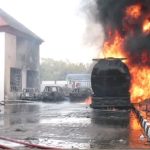The Nigerian Society of Engineers (NSE) has called for increased investment by the Nigerian government in mechanized farming, infrastructure, and energy to address the country’s food security and climate issues.
During a pre-conference media briefing for the National Engineering Conference and Annual General Meeting, set for November 19, 2024, NSE President Mrs. Margaret Oguntala stressed the importance of focusing on local production of farming equipment instead of relying on imports.
“Developing local farming equipment should be a priority for the government,” Mrs. Oguntala said. “Relying on imported agricultural machinery strains the economy and limits growth in the sector.”
The theme of the conference, “Pioneering Engineering Solutions to Nigeria’s Climate and Food Security Challenges,” addresses the need for sustainable engineering solutions to tackle food security and climate change.
Mrs. Oguntala stated that the conference would cover innovative solutions to improve agricultural output and resilience.
“We will explore advancements in agricultural machinery, such as automated tractors and precision seeders, to boost productivity,” she said. “We will also discuss efficient irrigation systems powered by sensor-based technologies and renewable energy solutions like mini-grid solar installations to help rural farmers achieve energy independence.”
The conference will also cover postharvest innovations, including solar-powered storage and mobile cold-chain solutions to reduce food loss across the agricultural value chain.
“We will discuss precision agriculture, where tools like remote sensing and soil health mapping can help farmers maximize yields and optimize resource use,” she added.
Mrs. Oguntala also emphasized the need to address climate change in Nigeria’s agricultural sector.
“We will discuss climate change adaptation strategies such as climate-resilient crop varieties and digital tools for early weather alerts, which are essential for protecting food systems in an unpredictable environment.”
Mrs. Oguntala further addressed the country’s infrastructure and energy crises, noting the collapse of Nigeria’s power grid and deteriorating infrastructure.
“Nigerian engineers have the knowledge, experience, and capacity to address these challenges. However, the government must invest in building new infrastructure and maintaining existing ones,” she said.
She stressed that the country’s energy demand far exceeds the current supply, highlighting the importance of renewable energy investments.
“Energy independence is key to the nation’s growth. Appointing an engineer as Minister of Power could provide the expertise needed to address our power challenges,” she concluded.
The National Engineering Conference is expected to focus on engineering-driven solutions to food security and climate challenges and to encourage collaborative efforts to secure a sustainable future for Nigeria.






